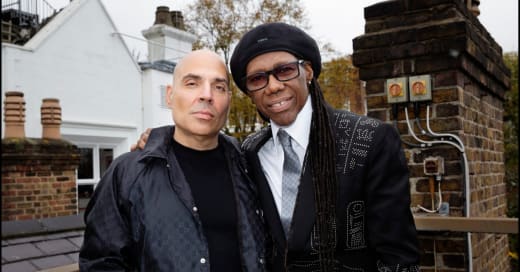Hipgnosis: The Billion-Dollar Bet
RHCP recently announced that they would be selling their entire song catalog for $140 Million to Hipgnosis: an investment firm that has plans to disrupt the entire Music publishing industry.
We write a daily newsletter on all things Music, and the Business and Tech behind it. If you’d like to get it directly in your inbox, subscribe now!
What’s good, people?
American rock band Red Hot Chilli Peppers recently announced that they were selling their entire catalog of music for $140 Million to an investment firm- Hipgnosis Songs Fund Ltd.
But why is an investment firm snapping up music copyrights for a Rock Band? Turns out, Hipgnosis is unlike any other investment company.
Founded in 2018 by Merck Mercuriadis- former manager of artists such as Elton John, Beyonce, and Guns & Roses among others, and Nile Rodgers- legendary guitarist and 3 times Grammy winner; Hipgnosis positions itself as a music IP investment and song management company and has raised $1.1 Billion since its IPO in 2018 on the London Stock Exchange.
But what do they actually do?
Hipgnosis was formed by Mercuriadis and Rodgers, with a vision to change how the music publishing business works, and give more power back to songwriters- who they argued, despite having the most important contribution in a song, get compensated the least.

In their pitch to investors, Hipgnosis makes the case that Intellectual Property Rights for the right music can act as a safe income stream, an alternative to stocks and gold, resistant to economic cycles. Their argument seemed to hold up in the pandemic; as most industries including live music crumbled; streaming of music and use of songs across media properties seemed to go through the roof.
Artists who struggled to earn any revenue streams from live shows; seemed to rely on their royalties from placement of their music in various media properties such as Movies, TV Shows, Video Games, and even election campaign rallies.

Hipgnosis aims to act as a platform to ensure that artists and songwriters can get a big “Pay-Day” by relinquishing their entire song catalogs, and not worry about the future earning potential of their royalty streams. They essentially de-risk themselves from an uncertain future by collecting a big sum up front and letting go of their royalty stream in the future.
Usually, these deals are struck at 15x earnings multiples, meaning that if an artist made $1 Million in royalties on an average every year, they would sign off rights to their song catalog for roughly $15 Million.
So far, Hipgnosis has managed to snap up publishing copyrights of more than 57,000 songs with enviable songwriters tapped up such as Shakira, The Chainsmokers, and Jack Anatoff- who wrote for several artists such as Taylor Swift, Lana Del Ray, and indie rock band ‘Fun’.

However, Mercuriadis prides himself in increasing the earning potential of classic hits. Hipgnosis’ snapped up legendary songwriters such as Neil Young- who sold 50% of his 1180 song catalog for roughly $100 million, RZA of the hip-hop group Wu-Tang Clan and Mark Ronson- best known for his work with Lady Gaga, Miley Cyrus, and Bruno Mars, with whom they made the hit single Uptown Funk.
While most of these deals are under Non-Disclosure Agreements, they can run into hundreds of millions of dollars, depending on the artist and their popularity. Hipgnosis then works towards ensuring that these songs in their catalog are correctly consumed across different forms of media, and increase their earning potential year-on-year.
For example, Hipgnosis owns the catalog of drummer, songwriter, and producer Al Jackson, Jr. His songs were earning around $400,000 a year in royalties. A year later under Hipgnosis’s control and distribution, the catalog started earning $600,000 per year with the songs appearing in TV commercials and John Legend using bits of it in his 2020 album “Bigger Love”
In this manner, Hipgnosis’ follows a philosophy to treat individual songs as business units and maximize their return, instead of letting them dust off a shelf like an old record. It is a disruptive model, which aims to change how artists view their music and how the publishing industry in general works.
However, Hipgnosis is not the only company eyeing the publishing market. Universal Music recently snapped up copyrights to the entire song catalog of Bob Dylan for roughly $400 million; Private Equity firm KKR & Co bought the copyrights for Grammy winner Ryan Tedder, who is the lead vocalist for rock band OneRepublic and co-wrote songs for Adele, Beyonce, and Paul McCartney.
Universal Music, Sony, and Warner Music, the de facto- “Big 3” when it comes to the Music Recording and Publishing industry, are being given a run for their money, when it comes to the publishing business from new-age players such as Hipgnosis and even traditional PE firms, looking to diversify their portfolio.
It is an exciting narrative that is folding out in the Music industry, with Hipgnosis so far posting roughly $90 million in revenues from the royalties of its song catalogs acquired over 2 years; and looking for ways to maximize their earning potential.
Mercuriadis aims to have roughly 150,000 songs under the Hipgnosis belt and aims to distribute these songs in an innovative manner; which does not hurt the brand of the artist and also maximizes the shareholder’s value. Its stock named under the ticker ‘SONG’ currently trades at £121 on the London Stock Exchange, up from the lows of £93.50 of March 2020.
While critics of Hipgnosis have questioned its extravagant deals and the logic behind its valuations; they have certainly awoken a sleeping giant in the music publishing industry, with the “Big 3” also looking into this space now, having traditionally focused more on recorded music.
It’s going to be an interesting battle to watch unfold.
If you liked this newsletter from Incentify, why not share it with someone you like? Let’s build the community :)
P.S- Follow us on Twitter now!










